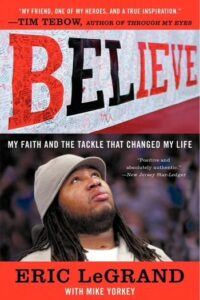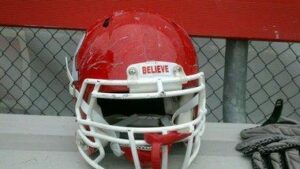October is Disability Awareness Month at Rutgers, when the community comes together to raise awareness highlighting diversity and disabilities with events hosted by the Office of Disability Services. October 16 is also a date for Rutgers to remember whether one likes football or not – the sad anniversary of the day that changed Eric Legrand (#52)’s life forever. What could be a more inspiring story for our community than the one that began with a tragic injury that day, but lead the former football player to become a source of inspiration, hope, and perseverance for people around the world?
Believe: My faith and the tackle that changed my life
 On October 16, 2010, the promising career of defensive tackle Eric Legrand (#52) of Rutgers Scarlet Knights changed overnight after a tackle during a game against Army. The entire MetLife Stadium watched in horror and tears as the 275-pound healthy young man had to be carted off the field. The initial shock and fear of hearing the bad news is unforgettable; the injury to his spinal cord left him paralyzed below the neck. One rarely sees the Rutgers community as united as at that time, worrying and praying for Eric LeGrand, one of our own.
On October 16, 2010, the promising career of defensive tackle Eric Legrand (#52) of Rutgers Scarlet Knights changed overnight after a tackle during a game against Army. The entire MetLife Stadium watched in horror and tears as the 275-pound healthy young man had to be carted off the field. The initial shock and fear of hearing the bad news is unforgettable; the injury to his spinal cord left him paralyzed below the neck. One rarely sees the Rutgers community as united as at that time, worrying and praying for Eric LeGrand, one of our own.
His fight for recovery started almost immediately, with a strong will to be able to breathe without a ventilator as soon as possible. He has been rebuilding his new life ever since, as presented in Talking about the moment of the life-changing accident with Anderson Cooper. In a nutshell, Rutgers alum Eric LeGrand has become a sports broadcaster and a motivational speaker, sharing hope and inspiration with words and acts such as leading his team through the tunnel to the field in a wheelchair a year after his injury.
His memoir from 2013, Believe: My faith and the tackle that changed my life, revealing the first steps of his long journey, is now available as an e-book from Rutgers University Libraries. Take it from this librarian who has never seen or been to a single football game, it is an inspirational read for all Rutgers affiliates, not only football fans.
bELieve
 As his sister, Nicole, suggests in the book, the BELIEVE phenomenon is almost a state of mind for Eric LeGrand. There’s a spiritual dimension to it – his childhood faith grew stronger and stronger to help him become what he is now – a global inspiration to diverse people, from athletes to the disabled.
As his sister, Nicole, suggests in the book, the BELIEVE phenomenon is almost a state of mind for Eric LeGrand. There’s a spiritual dimension to it – his childhood faith grew stronger and stronger to help him become what he is now – a global inspiration to diverse people, from athletes to the disabled.
In the book, LeGrand claims that there was an early indication when, before an exceptionally challenging high school game, he and his teammates jumped and tapped the big black block-lettered sign BELIEVE on top of the door on their way out of the locker room to the game. Believe was their motto, this was their routine. However, at that one time, tapping the sign was different, it felt like a special moment for him, as he recalls:
“slapping my fingers on the EL . . . for my initials, Eric LeGrand […] little did I know that BELIEVE would come to mean something completely different for me at Rutgers University.”
 Over the years, “BELIEVE” inspired many people, players and civilians alike. Those who were around for the 2010 season will remember the BELIEVE stickers attached to the front of the helmet of each Scarlet Knights player after Eric LeGrand’s injury.
Over the years, “BELIEVE” inspired many people, players and civilians alike. Those who were around for the 2010 season will remember the BELIEVE stickers attached to the front of the helmet of each Scarlet Knights player after Eric LeGrand’s injury.
BELIEVE also started to show up all over New Jersey and beyond, from the Eric LeGrand Believe Fund on a giant billboard to small wristbands, T-shirts, 5K walks, and charity events, all using “BELIEVE” imprinted in block capitals.
Today, his LeGrand Coffee House in Woodbridge serves customers on site and online, who need their “daily cup of bELieve” and who want to remember that they can also achieve their goals.
Believe: A book for everyone in New Jersey
With vivid descriptions from his early childhood to the life-changing event, the book follows Eric LeGrand’s athletic career with engaging biographical details, recreating a familiar New Jersey environment. The local atmosphere is even more palpable for the Rutgers reader as we visit the dorms and the Dining Hall on Busch Campus with the author, along with co-author Mike Yorkey. Many of us still remember the famous grease trucks on College Ave (across from Scott Hall, where the Yard is now), a major source of food and fun.
The book also provides a behind-the-scenes glimpse of athletic facilities, such as the Hale Center (a mystery for non-athletes) and the stadium (called SHI at that time) expanded to seat 52,454 in 2009, the site of the Birthplace of College Football, where Rutgers began playing in 1938.
Beautiful pictures of LeGrand’s life wrap up the book from his early childhood through Rutgers to the tragic day and its aftermath. Snapshots from rehab at Kessler and the extensive list of acknowledgments indicate not only his gratitude to family, friends, teammates, and healthcare professionals but also his attitude and disposition in the years right after his injury.
Believe: Never give up
So much has happened in the ten years after the book was published! Eric LeGrand resumed his studies and is now a proud Rutgers graduate in Labor and Employment Relations. In 2014, the same year he graduated, he spoke to his fellow students at the Rutgers Commencement with his No. 52 hanging in the stadium. His number became the first in program history to be retired the year before.
Invited as a commentator and broadcaster for Scarlet Knights football in 2013, LeGrand became a sports analyst. At home games, he continued sharing his insight on the pre-game show, halftime report, and postgame wrap. For his outstanding performance, LeGrand was named the New Jersey Sportscaster of the Year in 2022. LeGrand has expanded his media presence, including motivational speaking engagements and various other media appearances.
A recipient of many honors and awards for his work to give back to his community, Eric LeGrand is an inspiring role model outside the football community. His official homepage lists the many ways he touches the lives of others. One of my favorites: Six years after his injury, the Eric LeGrand Park in the Avenel section of Woodbridge, NJ (where LeGrand used to play as a child) was dedicated to the football player. Growing up, there was no handicapped access in the area (or most places, to be precise). LeGrand is pleased to speak about the playground where special needs children and disabled parents can now spend time safely.
Believe: Superman 2.0
Inspired by Kessler Rehab for spinal cord injury (the same place where Christopher Reeve was recovering), Eric LeGrand founded Team LeGrand, a charity arm of the Christopher & Dana Reeve Foundation, in 2013. Dedicated to curing spinal cord injury, Team LeGrand has raised over $1 million through various events and fundraisers to support research to treat and cure spinal cord injuries and help QoL (quality of life) for people living with the condition.

A Walk to Believe: One Step at a Time for Eric LeGrand in 2024 (an annual 5K walk/run). Image credits: A Walk to Believe Facebook page
Christopher Reeve’s dream of empty wheelchairs used to hit me hard when our parking lot at the Center of Alcohol Studies, shared with the W. M. Keck Center for Collaborative Neuroscience, was shut down for the day once a year, to accommodate wheelchair-bound participants of their annual event. When Christopher and Dana Reeve attended, they waited for the event to start at the Center of Alcohol Studies Library, which was fully wheelchair-accessible, courtesy of the Center’s Business Manager and his strict adherence to ADA compliance.
Believe: Disabilities and bibliotherapy
In the early 2010s, we started our first bibliotherapy-inspired project, Reading for Recovery, for another special population undergoing a rather different type of recovery. Guided reading, also known as bibliotherapy, is the practice of using curated lists of books and other texts to address a personal issue, related to one’s physical or mental health. Despite its potential benefits, the role of therapeutic reading for people with disabilities is overlooked.
When one is trying to make sense of something that doesn’t make sense at all, while trying to deal with the anger of “Why me?,” reading, discussing, and writing about these experiences helps one think things through, sort them out, and perhaps get started on the journey toward acceptance, whether it’s a sudden onset disability or chronic/terminal condition.
Libraries are uniquely positioned to fulfill this need by providing curated reading lists. However, increased awareness, more research, and better integration of therapeutic reading into existing treatment plans could also be beneficial. This is what Disability Awareness Month is about and we are honored to contribute with our posts. Read the previous post, The Country of the Blind, and stay tuned for more!
From Rutgers University Libraries
- LeGrand, E., & Yorkey, M. (2013). Believe: My faith and the tackle that changed my life. (1st ed.). HarperCollins Publishers. – The original memoir, as reviewed above. Available online, single-user license (check back if it’s not immediately available)
-
LeGrand, E., & Yorkey, M. (2012). Believe: The victorious story of Eric LeGrand (1st ed.). HarperCollins. – A version adapted for young readers. Avaialble in Special Collections, in house use only.